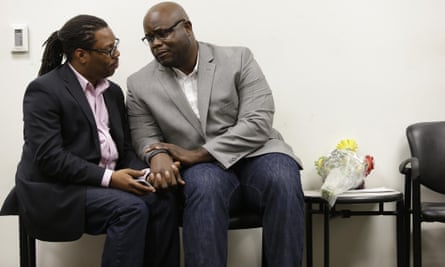Almost immediately after the supreme court on Friday made same-sex marriage a right throughout the United States, conservative leaders around the south indicated they would resist the ruling with delay, bureaucratic niggling and circumvention of the verdict on religious grounds.
Texas governor Greg Abbott quickly gave state officials his tacit approval to deny same-sex couples marriage licenses should the officials object on religious grounds. On Friday, Abbott sent agencies a memo, railing against “religious coercion” and citing the Texas Religious Freedom Restoration Act, that directed them to take no action against any official “on account of the person’s act or refusal to act that is substantially motivated by sincere religious belief”.
“No Texan is required by the supreme court’s decision to act contrary to his or her religious beliefs regarding marriage,” Abbott said.
The state’s attorney general, Ken Paxton, urged county clerks not to issue licenses without his permission. Clerks in at least five counties heeded his warning. Others bucked, including a Dallas County clerk who bluntly remarked that Paxton’s office “does not trump the highest court in the land”. An octogenarian couple, together for more than 50 years, promptly married in the Dallas courthouse.
Paxton then hinted that Texas would pursue measures akin to a law recently passed by North Carolina, over the veto of that state’s governor, which allows state officials to opt out of marrying same-sex couples on the basis of a “sincerely held religious objection”. In a statement, Abbott used almost identical language.
Paxton went further, saying Texas would respond by “recognizing the primacy and importance of our first freedom – religious liberty”. The attorney general said Texas would move to protect religious people from “abuse” and said his office “will be addressing questions about the religious liberties of clerks of court and justices of the peace”.
He also suggested that Texas would move to “protect religious adoption” and “prevent harassing lawsuits against people of faith, their businesses and religious organizations”.
Louisiana governor Bobby Jindal – a declared candidate for president in 2016 – made similar remarks, saying in a statement: “This decision will pave the way for an all out assault against the religious freedom rights of Christians who disagree.”
His state’s attorney general, James “Buddy” Caldwell, attempted to stall the ruling, saying his office “found nothing in today’s decision that makes the court’s order effective immediately”.
On the grounds of a technicality in the law, Caldwell’s office told county clerks to wait 25 days before issuing any licenses. Caldwell said he would “watch” for the supreme court to make its decision final and effective.
The mood in New Orleans was even more celebratory than usual, however, even though couples who tried to marry ran into a wall of bureaucracy.
Earl Benjamin, 39, and Michael Robinson, 41, arrived at the New Orleans records office moments after the supreme court’s announcement. Officials told them there would be a delay as they had to reboot the computer system and were “waiting for clearance”.
The pair felt officials were deliberately dragging their heels.
“It’s mixed emotions for sure. For us right now it’s become painfully clear that there’s some resistance to us getting a license,” Robinson said, as the couple clutched flowers and boxes of cupcakes brought by friends.
“We’re still excited but we’re also a bit saddened that we weren’t able to get our license today,” Benjamin said after leaving the office. “You become accustomed to discrimination, you come to expect it. We’re going to be looking forward to marrying each other soon.”

In contrast, Southern Baptist leaders in the state spoke of doom and gloom. One leader, Frank Page, said the decision heralded “a time of deep spiritual darkness” akin to an Old Testament epoch when “Israel had no kings”.
In an indicator of the prevailing local political attitude, last year the Louisiana House of Representatives overwhelmingly refused to remove the state’s anti-sodomy statute, even though it is legally unenforceable and was declared unconstitutional by the US supreme court in 2003.
Still, Josh Aldridge, a former teacher who lives in New Orleans, believed that even in more conservative parts of the south, attitudes were changing.
“When I was in high school I would never have dreamed of coming out,” he said. “Now you’re seeing more and more kids coming out because they’re not afraid, they don’t think they’re oddities.”
Mississippi also tried delay the decision from taking effect, but ambivalent statements from attorney general Jim Hood simply led to a brief moment of confusion. At least one couple wed in the state before clerks received an order from Hood to stop issuing licenses.
Hood later qualified his order, saying in a statement that he was “certainly not standing in the way of the supreme court’s decision”.
“We simply want to inform our citizens of the procedure that takes effect after this ruling,” Hood said, adding that Mississippi would wait for an appeals court to lift its stay on marriages. “The supreme court decision is the law of the land and we do not dispute that. “
Governor Phil Bryant only offered a grudging acceptance of the order, saying the court had overreached into states’ rights and was “certainly out of step with the majority of Mississippians”.
Other conservative bastions proved far less rebellious, at least overtly. In Alabama, where elected state judges have squabbled with their federal counterparts for months about the legality of same-sex marriage, the windows at the Mobile County courthouse finally opened for couples.
Attorney general Luther Strange said that despite his personal opposition, “I acknowledge that the US supreme court’s ruling is now the law of the land.”

Comments (…)
Sign in or create your Guardian account to join the discussion